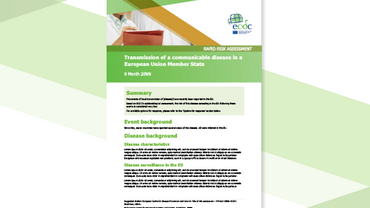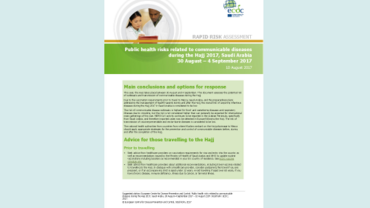Rapid risk assessment: Severe respiratory disease associated with Middle East respiratory syndrome coronavirus (MERS-CoV). 19th update, 31 July 2015
The Middle East respiratory syndrome coronavirus (MERS-CoV) outbreak continues to pose a low risk to the EU with regards to the importation of MERS cases. Although sustained community transmission has not been observed, transmission to close contacts of imported cases, including to healthcare workers, and other patients and visitors in hospitals has been reported, most recently in South Korea, and in France, the United Kingdom and Iran.
This update was prompted in order to reassess the risk for European travellers to South Korea now that there have been no additional cases reported since 4 July 2015.
Executive Summary
Since there have been no new cases of Middle East Respiratory Syndrome (MERS) in South Korea since 4 July 2015, ECDC has determined in its updated rapid risk assessment that the risk posed by the disease to visitors of the country is negligible. South Korea cannot be declared free of the disease until 28 days after the last case being treated has twice tested negative or has died.
The risk posed by the disease to visitors to Saudi Arabia remains low, and is most likely related to exposure to live camels and camel products, or to healthcare facilities.
The World Health Organization does not recommend travel restrictions with regards to MERS-CoV. Travellers to affected countries should be made aware of the disease and reminded of the importance of good hand and food hygiene.
Between 21 and 26 September this year, the Hajj will be taking place in Saudi Arabia. The Ministry of Health of Saudi Arabia advises the elderly and individuals with chronic diseases to postpone their pilgrimage for their own safety.
Travellers returning from countries affected by MERS should seek medical attention if they develop a respiratory illness with fever and cough during the two weeks after their return. They should inform their healthcare provider of their recent travel history.







